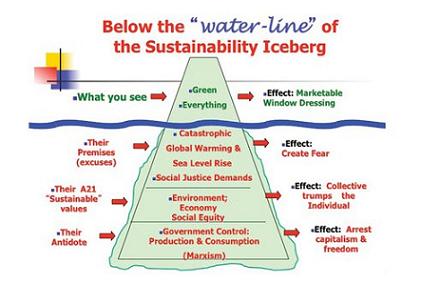 Agenda 21 – the United Nation’s plan to control land, sea and air is now well on the way to becoming law as it passed the “Conservative” Virginia House of Delegates. HB 2048 stinks to high heaven.
Agenda 21 – the United Nation’s plan to control land, sea and air is now well on the way to becoming law as it passed the “Conservative” Virginia House of Delegates. HB 2048 stinks to high heaven.
The fight is not over. The bill must be read on the floor before being voted for final passage. There is still time to kill it. Giving the DEQ (the state variant of the EPA) more power and authority is never a good idea.
If the bill as originally written wasn’t bad enough, it was amended into a 92 page bill in a single day while in committee. There was no transparency in the process of drafting and adopting the substitute and I doubt seriously that any of the legislators had the opportunity to read the entire 92 page substitute bill, let alone understand it before they voted to pass it.
The bill moves several water quality programs currently administered by the Department of Conservation and Recreation to the Department of Environmental Quality. The Department of Environmental Quality and the State Water Control Board will have oversight of water quality planning and laws dealing with stormwater management, erosion and sediment control, and the Chesapeake Bay Preservation Areas.
The Virginia Soil and Water Conservation Board will have continuing responsibility for oversight of the soil and water conservation districts and of resource management planning and will continue to be responsible for administration of the flood prevention and dam safety laws, at least for the present.
Let me just give you a glimpse of the power grab contained in this bill.
Article 1.7. Resource Management Plans. The Virginia Soil and Water Conservation Board shall by regulation, and in consultation with the Department of Agriculture and Consumer Services specify the criteria to be included in a resource management plan. The regulations shall:
A . For all cropland or speciality crops, such components shall include the following, as needed and based upon an individual on-farm assessment:
- A nutrient management plan that that meets the nutrient management specifications developed by the Department;
- A forest or grass buffer between cropland and perennial streams of sufficient width to meet water quality objectives and consistent with Natural Resources Conservation Service standards and specifications;
- A soil conservation plan that achieves a maximum soil loss rate of “T,” as defined by the Natural Resources Conservation Service; and
- Cover crops meeting best management practice specifications as determined by the Natural Resource Conservation Sservice or the Virginia Agricultural Best Management Practices Cost-Share Program.
B. For all hayland, such components shall include the following, as needed and based upon an individual on-farm assessment:
- A nutrient management plan that meets the nutrient management specifications developed by the Department;
- A forest or grass buffer between cropland and perennial streams of sufficient width to meet water quality objectives and consistent with Natural Resources Conservation Service standards and specifications; and
- A soil conservation plan that achieves a maximum soil loss rate of “T,” as defined by the Natural Resources Conservation Service.
- For all pasture, such components shall include the following as needed and based upon an individual on farm assessment.
- A system that limits or prevents livestock access to perennial streams; and
- A pasture management plan or soil conservation plan that achieves a maximum soil loss rate of “T” as defined by the Natural Resources Conservation Service.
Article I.6. Watershed Improvement Districts, Section 10.l-1187.101 states that in addition to any other powers conferred on it by law, and watershed improvement district organized under the provisions of this article shall be authorized to acquire by eminent domain any lands, property rights, franchises, rights-of-way, easements, or other property deemed necessary or convenient for the efficient operation of the district. Such proceedings shall be in accordance with and subject to the provisions of the laws of the Commonwealth applicable to the exercise of the power of eminent domain in the name of a public service company and subject to the provisions of Chapter 2 (§ 25.1-200 et seq.) of Title 25.1.
Starting to get the drift?
Separations of power is essential to preserving the rights and freedoms of individuals from those who would seek to consolidate that power for their own gain. Such separations are the only barrier between a free nation and despotism. The same holds true here.
Combining all permitting and planning programs at the DEQ breaks down the protections for citizens inherently found in maintaining those programs under another agency, the sole focus of which is not maximum regulation. The true intent behind the bill is to increase the reach and power of the Department of Environmental Quality.
The biggest shield against Federal overreach by the EPA, or any other agency, is the Office of the Attorney General as evidenced by the recent lawsuit Virginia Department of Transportation, et al v United States Environmental Protection Agency, et al. E.D. VA., No. 1-12cv775, (2013). If the DEQ’s intent is to push back against the EPA, they would have at the very least joined in the lawsuit.
So which Republicans screwed us? The list is long, my friends. 50 Republicans voted to take away your property rights. The knives are sunk deep in our backs as well as our wallets. And I am ashamed to say I have – in the past – supported some of these traitors.
The bill has already passed the House. It is imperative that you quickly contact your state senator and demand that it die a quick death.

